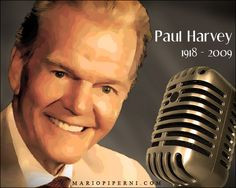
Download paul harveys the rest of the story free
But Paul Harvey was also a delightful history teacher — with a velvety voice that turned the news into narrative and entertainment each week on his famous segment The Rest of the Story.
For more than three decades, from the s to his death in , Harvey would address his millions of listeners six days a week, giving them the backstory to people, things and events both famous and not-so-known.
From the origin of Coca-Cola to an account of JFK's assassination through his widow's eyes, from his tales of Elvis Presley's childhood to the Revolutionary War, the Oklahoma native had a magical fluidity to his storytelling. To hear him now is to feel at least a little nostalgic for that classic-radio mid-American accent — the kind that makes you think of political power in the s and '50s, from FDR to Truman.
Indeed, Harvey came out of that age of politics: He briefly served in World War II but was discharged (possibly for psychiatric reasons, an account he disputed). He made his way to Chicago, where he took up broadcasting on ABC — and he didn't leave the airwaves for years.
He quickly made his name by explaining the "mysteries of history" and commenting, sometimes with extreme fervor, on the decline of American moralism. There is his classic, Jonathan Edwards-esque If I Were the Devil: How to Destroy America.
And how many know that Harvey earned a permanent spot in the history textbooks when he coined the phraseReaganomics?
A longtime lover of history — a love cultivated by a single mother who raised him after his policeman father was killed — Harvey made waves early, getting his first radio gig at just age And even though he would have plenty of mentors along the way, his work was most often honed by his wife — and producer — who was also a fervent student of history and a graduate of Washington University in St. Louis.
But as I and any other editor, writer, reporter or media professional will tell you, it's often not enough to have the right voice, stories and supporting team. What every storytelling program needs is an investor, and among Harvey's truest gifts was his ability to keep sponsors.
Much like the ubiquitous voice on NPR thanking the John D. and Catherine T. MacArthur Foundation, Harvey's voice, transitioning seamlessly from a story to commentary to a carefully placed advertisement, became a kind of brand kingmaker. People trusted what he was telling, and so they trusted what he was selling.
Harvey's success in bringing backstories and history to life arguably paved the way for many American documentary programs like Behind the Music. He was a master at connecting yesterday to the present and to tomorrow — he was an early proponent of drawing insight from the past in order to do better in the future.
His guest hosts in the s and s are faces we still see in conservative circles of power and politics. When Harvey passed away in , his show was taken over briefly by his son, followed by Gil Gross and then Mike Huckabee. But it didn't last without him and ultimately gave way to a new generation of increasingly strident political and family-values radio.
For now, though, listen to Harvey, who's speaking in the aftermath of President John F. Kennedy's assassination, as he discusses the "utter futility of words." Coming from him, they were anything but.


-